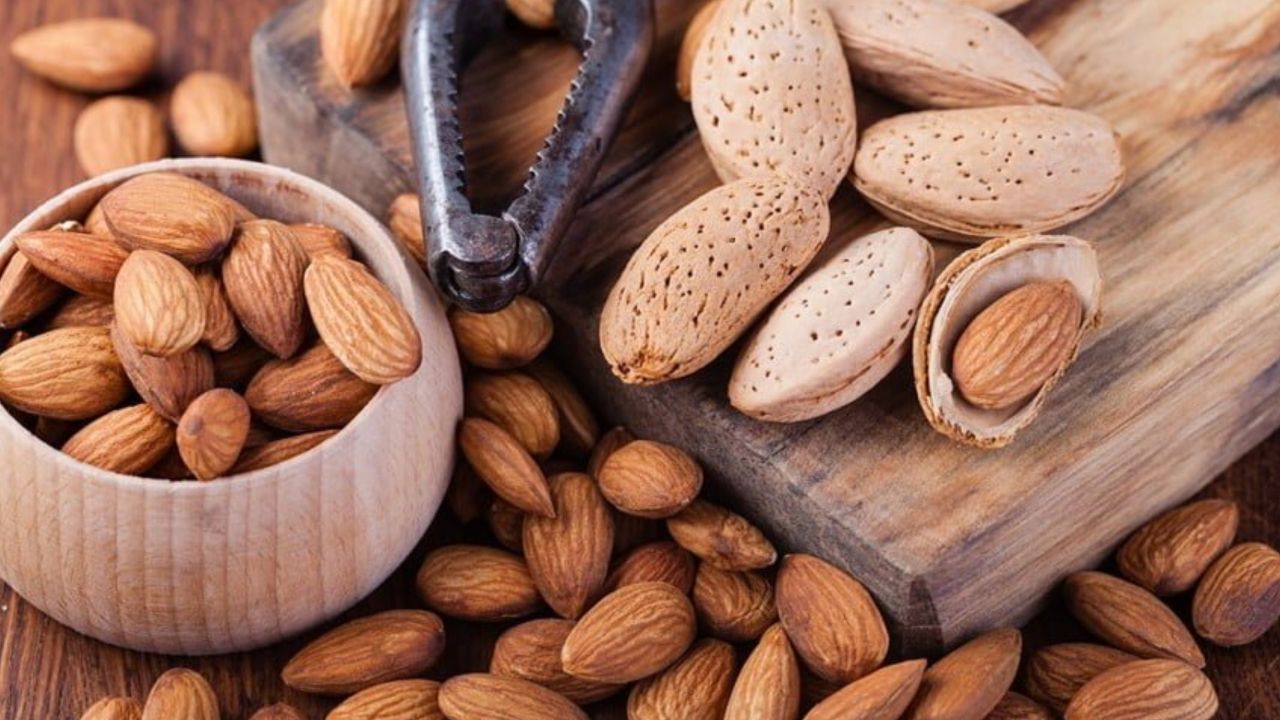Almond (Badam) in Ayurveda: A Natural Superfood for Wellness
In Ayurveda, food and nutrition are central to maintaining health and preventing illness. The system believes that food has the power to influence the body’s internal balance and can either support or disrupt the flow of energy. 
Ayurveda looks beyond just the nutritional value of food, considering its qualities such as taste, temperature, texture, and how these aspects interact with the body’s doshas (Vata, Pitta, and Kapha). It also emphasizes the timing of meals, taking into account the time of day and the season, to optimize digestion and absorption.
Ayurveda encourages mindful eating—paying attention to the body’s signals and eating in harmony with its needs. This holistic approach nourishes not only the physical body but also the mind, fostering emotional well-being and promoting long-term health. By aligning food choices with Ayurvedic principles, we can achieve a balanced, vibrant life.
Role of Specific Foods in Balancing Doshas
The three primary doshas—Vata, Pitta, and Kapha—represent the elemental forces that govern physical and mental processes in the body. Each person has a unique combination of these doshas, which affects their constitution and health. Diet plays a key role in balancing these doshas:
Vata (Air and Space):
- Imbalance signs: Dryness, anxiety, and irregular digestion.
- Balancing foods: Warm, moist, and grounding foods are beneficial for Vata types. Root vegetables, dairy, and healthy fats like ghee help to calm the airy, dry qualities of Vata.
Pitta (Fire and Water):
- Imbalance signs: Inflammation, anger, and digestive issues.
- Balancing foods: Cooling and hydrating foods help to soothe Pitta. Sweet fruits, leafy greens, coconut, and dairy products can counteract Pitta’s fiery nature.
Kapha (Earth and Water):
- Imbalance signs: Lethargy, congestion, and weight gain.
- Balancing foods: Light, spicy, and warm foods are ideal for Kapha types. Beans, leafy greens, and foods with a bitter or pungent taste help to stimulate digestion and reduce excess moisture and heaviness.
By eating in alignment with one’s doshic constitution and the changes in season, Ayurveda believes that we can maintain harmony in the body and mind, leading to overall health and vitality.
Almonds in Ayurveda
Almonds, scientifically known as Prunus amygdalus, are the seeds of the fruit of the almond tree. In Ayurveda, almonds are considered a nourishing food that has a variety of health benefits.
Almonds are known for their ability to balance the three doshas (Vata, Pitta, and Kapha) when consumed appropriately. They are particularly beneficial for Vata types, as their rich, oily texture helps to hydrate and ground the body.
For Pitta types, almonds can calm the heat, especially when consumed in moderation. For Kapha types, almonds can be beneficial but should be consumed in small amounts, as they are dense and could contribute to the buildup of excess moisture.
Almonds are considered “medhya” (beneficial for the mind) in Ayurveda, as they are believed to enhance memory, cognition, and overall brain function. They are also thought to promote ojas, the vital energy that supports immunity, vitality, and overall well-being.
Soaking almonds overnight and consuming them in the morning is a traditional Ayurvedic practice, as it is believed to make them easier to digest and increase their health benefits.
Almonds as a “Satvic” (Pure) Food in Ayurveda
In the context of Ayurvedic philosophy, foods are classified into three categories based on their effect on the mind and body: Sattvic, Rajasic, and Tamasic.
- Sattvic foods are considered pure, light, and nourishing, promoting clarity, peace, and mental stability. They are thought to support spiritual growth and balance.
Almonds are classified as Satvic due to their pure and nourishing qualities. They are rich in nutrients that support the body’s vitality and mind’s clarity. Their qualities of being wholesome, grounding, and sustaining make them a favorite in a Sattvic diet.
Almonds help to maintain a calm and clear mind, promoting focus, mental sharpness, and spiritual practices. They are often used in Ayurvedic preparations for increasing mental faculties and building physical strength.
In sum, almonds in Ayurveda are considered a versatile and highly beneficial food, aligning with the principles of health and spiritual well-being. They are valued not just for their physical nourishing properties but also for their ability to promote purity and clarity of mind.
Key Nutrients in Almonds:
- Healthy Fats: Almonds are a rich source of monounsaturated fats, which are heart-healthy and support the body’s overall vitality.
- Proteins: Almonds contain a good amount of plant-based protein, contributing to muscle repair, immune function, and overall strength.
- Fiber: Almonds are high in dietary fiber, which aids in digestion, helps regulate blood sugar levels, and supports heart health.
Vitamins:
- Vitamin E: Known for its antioxidant properties, Vitamin E helps protect cells from oxidative stress, supports skin health, and contributes to overall vitality.
- B Complex Vitamins: Almonds are rich in B vitamins such as riboflavin (B2), niacin (B3), and folate, which are essential for energy production, mental clarity, and maintaining a healthy nervous system.
Minerals:
- Magnesium: Essential for muscle and nerve function, magnesium helps to regulate blood pressure, promote relaxation, and support the bones.
- Calcium: Almonds provide a plant-based source of calcium, which is crucial for bone health and supports the body’s skeletal system.
Importance of These Nutrients in Ayurveda
In Ayurveda, these nutrients play a key role in balancing the body’s doshas and promoting overall health. The healthy fats in almonds nourish tissues (dhatus) and promote ojas, which is vital energy.
The high protein content supports muscle tissue and bodily strength. The fiber aids in digestive health, which is crucial in Ayurveda for maintaining the balance of doshas.
Additionally, vitamins and minerals, especially magnesium and calcium, help to stabilize mental clarity and calm the body, both of which align with Ayurvedic principles of achieving harmony.
Almond Ayurvedic properties
- Rasa (Taste): Almonds have a sweet taste, with a slight bitter undertone. In Ayurveda, taste plays a significant role in determining how food impacts the body and mind. The sweet taste is grounding, soothing, and nourishing, while the slight bitterness can be cleansing and detoxifying.
- Virya (Potency): Almonds are considered warm in potency. This quality makes them beneficial for balancing Vata and Pitta doshas, especially during cold weather. The warm nature of almonds helps stimulate digestion and metabolism, providing strength and vigor to the body.
- Vipaka (Post-digestive Effect): The post-digestive effect of almonds is sweet, which further emphasizes their nourishing and grounding qualities. This post-digestive sweetness helps to build ojas, the vital essence that supports immunity, strength, and overall vitality.
Dosha Effect
- Balances Vata and Pitta Doshas: Almonds are excellent for balancing Vata and Pitta. The nourishing and grounding nature of almonds helps calm the dry, light qualities of Vata. At the same time, the sweet and slightly bitter taste helps to soothe the heat and sharpness of Pitta, particularly when consumed in moderation.
- Can Increase Kapha When Consumed in Excess: While almonds are beneficial for balancing Vata and Pitta, they can increase Kapha when consumed in excess. This is due to their rich, oily, and dense qualities. Overconsumption of almonds could lead to excess weight gain, sluggish digestion, and congestion—qualities associated with Kapha imbalance. Therefore, it is important to consume almonds in moderation, particularly for Kapha types.
In summary, almonds, with their rich nutrient profile and balancing effects on the doshas, serve as a vital part of Ayurvedic nutrition. They are valued for their ability to nourish the body and mind, promote vitality, and help maintain doshic harmony when used appropriately.
Top 10 Health Benefits of Almonds According to Ayurveda
1. Improvement of Brain Function
Almonds are highly regarded in Ayurveda for their ability to enhance mental clarity, memory, and overall cognitive function. The high levels of healthy fats, vitamin E, and B vitamins in almonds are believed to nourish the brain and nervous system.
Almonds are particularly beneficial for individuals with a Vata imbalance, which affects the nervous system and can lead to symptoms like anxiety, forgetfulness, and restlessness. Soaking almonds overnight and consuming them in the morning is a common Ayurvedic practice to maximize their brain-boosting potential.
2. Skin Health
Due to their moisturizing and soothing properties, almonds are recommended in Ayurveda for treating various Pitta-type skin disorders, such as acne, rashes, and inflammation.
The oils in almonds help hydrate the skin and calm the excess heat and irritation that are characteristic of Pitta imbalances. Additionally, almond oil is often used in Ayurvedic treatments to promote healthy, glowing skin and alleviate skin dryness or inflammation.
3. Heart Health
Almonds are known to promote cardiovascular health by helping to regulate cholesterol levels. They contain heart-healthy monounsaturated fats and magnesium, which support blood circulation and the overall health of the heart.
For Pitta types, who are prone to inflammatory conditions and issues related to the heart (such as high blood pressure), almonds can help to balance the excess heat and support heart health. Regular consumption of almonds can contribute to maintaining a healthy heart and reducing the risk of heart disease.
4. Boosting Digestion
In Ayurveda, digestion is a key factor in maintaining overall health, and almonds play a role in improving Agni (digestive fire). Almonds are considered a heavy food, making them beneficial for improving digestive strength in those with weak Agni.
When soaked overnight, almonds become easier to digest, helping to improve assimilation of nutrients. They also promote regular bowel movements and can alleviate constipation, which is often a concern for those with a Vata imbalance.
5. Detoxification and Immunity
Almonds are rich in antioxidants, such as vitamin E, which help to protect the body from oxidative stress and support the detoxification process.
According to Ayurveda, almonds help cleanse the body of toxins (Ama) and support the immune system, particularly through their nourishing and restorative qualities. They are believed to strengthen ojas, the essence of immunity and vitality, leading to enhanced resistance to illness and overall vitality.
6. Support for Reproductive Health
Almonds are considered nourishing for Shukra Dhatu, the reproductive tissue in Ayurveda. Almonds are believed to enhance fertility and vitality by nourishing the reproductive system, improving energy levels, and supporting Shukra Dhatu.
Regular consumption of almonds is said to enhance sexual health and increase overall vitality, particularly for individuals seeking to support reproductive health.
7. Improving Sleep Quality
Almonds are believed to promote better sleep in Ayurveda, particularly for individuals with Vata imbalances that often lead to restlessness and sleep disturbances.
Almonds are rich in magnesium, a mineral that is known to help relax muscles, calm the nervous system, and promote restful sleep. Consuming almonds, especially soaked almonds, before bedtime is said to help reduce insomnia and improve the quality of sleep.
8. Supporting Weight Management
Almonds, with their high fiber and protein content, are an excellent food for promoting satiety and supporting weight management.
In Ayurveda, Kapha-type individuals, who tend to have a slower metabolism and may struggle with weight gain, can benefit from almonds in moderation.
Their rich nutritional profile helps balance hunger and cravings while providing sustained energy. Almonds also help maintain metabolic function and support healthy digestion.
9. Strengthening Bones and Joints
Due to their high calcium and magnesium content, almonds are often recommended in Ayurveda for promoting bone health and preventing conditions such as osteoporosis.
These minerals help strengthen bones and joints, making almonds a valuable addition to the diet for individuals with Vata imbalances, which can lead to brittle bones and joint discomfort. Almonds can also support the production of synovial fluid, which keeps the joints lubricated and flexible.
10. Promoting Healthy Hair
Almonds are regarded as a natural tonic for hair in Ayurveda due to their high content of vitamin E, magnesium, and healthy fats.
These nutrients nourish the scalp, strengthen hair follicles, and support healthy hair growth. Regular consumption of almonds, along with topical use of almond oil, is thought to improve hair texture, prevent hair thinning, and promote overall scalp health.
For individuals with Pitta imbalances, which can lead to hair loss or scalp irritation, almonds can help soothe the scalp and prevent excessive shedding.
Ayurvedic Preparations and Usage of Almonds
1. Almond Milk
Almond milk is a popular preparation in Ayurveda, especially for calming Pitta and nourishing the body. Made by blending soaked almonds with water, this milk is considered cooling and soothing, ideal for those experiencing Pitta imbalances like inflammation, acidity, or skin rashes.
It helps to nourish both the body and the mind, promoting a sense of calm and relaxation. Almond milk is often consumed warm or at room temperature to enhance its benefits for digestion and to support the overall balance of the doshas. It can also be sweetened with a little honey or flavored with cardamom for additional digestive benefits.
2. Almond Paste
Almond paste is widely used in Ayurveda for skincare and is a key ingredient in face masks to promote a glowing complexion.
The paste is made by grinding almonds into a smooth consistency, often mixed with natural ingredients like milk, turmeric, or sandalwood powder. This combination helps to hydrate, exfoliate, and detoxify the skin, making it a great remedy for dry skin, acne, or skin inflammation.
Almond paste is also thought to reduce the appearance of dark circles and blemishes, leaving the skin radiant and nourished.
3. Almond Oil
Almond oil is a highly versatile oil in Ayurveda, valued for its nourishing and moisturizing properties. It is used for massage therapy, particularly to improve circulation, reduce dryness, and relieve tension.
Massaging almond oil into the skin helps retain moisture and softens the skin, making it an excellent remedy for Vata imbalances, which often result in dry or rough skin.
Additionally, almond oil is commonly applied to the scalp and hair to reduce dryness, prevent hair thinning, and promote shiny, healthy hair. It is also used to soothe itchy or inflamed skin, providing relief from conditions like eczema or psoriasis.
Almond in Medicinal Formulas
Almonds are often used in Ayurvedic medicinal formulas to balance doshas and treat specific ailments. They are frequently combined with other herbs and spices to address various health concerns. For example:
- For Vata imbalances: Almonds may be paired with ghee or warm milk to help ground and soothe the nervous system, promoting relaxation and mental clarity.
- For Pitta imbalances: Almonds can be used alongside coconut or sandalwood to reduce heat and inflammation in the body, especially for conditions like acne, indigestion, or acid reflux.
- For Kapha imbalances: When combined with ginger or turmeric, almonds help stimulate digestion and improve circulation, helping to reduce excess mucus or weight.
Almonds, when integrated into Ayurvedic remedies, are often used in the form of pastilles, powders, or tonics, to be consumed or applied topically as part of a holistic treatment approach. These formulas aim to balance the doshas, improve vitality, and promote overall health.
Precautions and Considerations
1. Recommended Serving Size to Avoid Excess Intake (Kapha Balance)
Almonds, while nutritious, are also high in fats and calories. Excessive intake may increase Kapha, the dosha associated with earth and water elements, leading to imbalances such as weight gain, sluggish digestion, or excess mucus production.
To maintain balance, it’s important to consume almonds in moderation, especially for those who have a naturally higher Kapha constitution. The recommended serving size typically ranges from 5–10 almonds per day, which provides the nutritional benefits without overwhelming the system.
2. Warming Properties of Almonds and Their Suitability for Different Seasons
Almonds have warming qualities, which makes them particularly suitable for colder weather or seasons, such as fall and winter. In Ayurveda, foods with warming properties are thought to support digestion and metabolism in cold temperatures.
In warmer months, when the body tends to already be in a “heated” state, eating too many warming foods (like almonds) can aggravate Pitta dosha, leading to issues such as inflammation or skin problems. Therefore, it’s ideal to consume almonds more during the colder seasons to balance the body’s natural energy.
3. Importance of Soaking Almonds Before Consumption
Soaking almonds before eating them is highly recommended in Ayurveda. Soaking helps to:
- Enhance digestion: The outer skin of almonds contains phytic acid, which can inhibit the absorption of minerals. Soaking reduces this compound, making the almonds easier to digest.
- Increase nutrient absorption: Soaking helps to activate enzymes that promote the breakdown of nutrients, making them more bioavailable.
- Reduce acidity: Soaked almonds are less likely to cause digestive discomfort (such as acid reflux) compared to dry almonds.
To soak almonds, simply place them in water overnight or for at least 8–12 hours, then peel off the skin before consuming.
FAQ’s
1. What are the benefits of almonds sexually?
Almonds are rich in essential fatty acids, vitamins, and minerals that can improve circulation, boost energy, and enhance vitality, which may support sexual health.
2. What are the benefits of almonds soaked in water?
Soaked almonds improve digestion, enhance nutrient absorption, reduce acidity, and are easier on the stomach, making them a great choice for better overall health.
3. What are the benefits of almonds for skin?
Almonds are rich in vitamin E, which promotes healthy, glowing skin by providing antioxidants that fight aging and improve hydration.
4. What are the benefits of eating almonds in the morning?
Eating almonds in the morning can provide sustained energy, support cognitive function, improve digestion, and help regulate blood sugar levels throughout the day.
5. What are the benefits of almonds for the brain?
Almonds are a great source of omega-3 fatty acids, vitamin E, and antioxidants, which support cognitive function, memory, and overall brain health.
6. What are the Ayurvedic properties of almonds?
Almonds are considered balancing for Vata and Pitta doshas, having warming and nourishing properties. They promote vitality, enhance digestion, and improve mental clarity.
7. Are soaked almonds good for Pitta dosha?
Soaked almonds are beneficial for Pitta dosha as they have a cooling effect, help balance excess heat, and promote hydration and mental calmness.
8. What are the benefits of almond oil in Ayurveda?
Almond oil is known for its nourishing properties, helping to balance Vata dosha. It moisturizes the skin, promotes hair health, and supports joint lubrication and overall vitality.
9. What are the side effects of almond oil with milk?
While almond oil and milk are generally safe together, excessive consumption may cause digestive discomfort or interfere with digestion due to the richness of fats in both.
10. What are the benefits of almond oil in milk for males?
Almond oil in milk can improve energy, support skin health, and enhance libido in men by nourishing the body and providing essential nutrients.
12. How many almonds should you eat per day according to Ayurveda?
Ayurveda recommends consuming about 5-10 almonds per day for optimal health, balancing nutrition without overloading the digestive system.
13. Are almonds warming or cooling?
Almonds have warming properties in Ayurveda, making them more suitable for colder weather or for balancing Vata and Kapha doshas.
14. What are the benefits of almonds in Ayurveda?
Almonds in Ayurveda support digestion, boost vitality, enhance mental clarity, and help balance the doshas, particularly Vata and Pitta.
15. What is the Ayurvedic name for almonds?
The Ayurvedic name for almonds is “Badam” or “Vatahara”, as they help calm Vata dosha.
16. Is 5 almonds a day enough?
Yes, consuming 5 almonds per day is sufficient for most people to gain the health benefits without overconsumption.
17. Should we remove the skin of soaked almonds?
Yes, it is advisable to remove the skin of soaked almonds, as it contains tannins that can inhibit nutrient absorption and may cause digestive discomfort.
Almond milk is a valuable Ayurvedic preparation that helps balance Pitta dosha, offering cooling and soothing effects for those with inflammatory or digestive issues. Its nourishing properties support overall health, both physically and mentally, while promoting calm and relaxation.

























